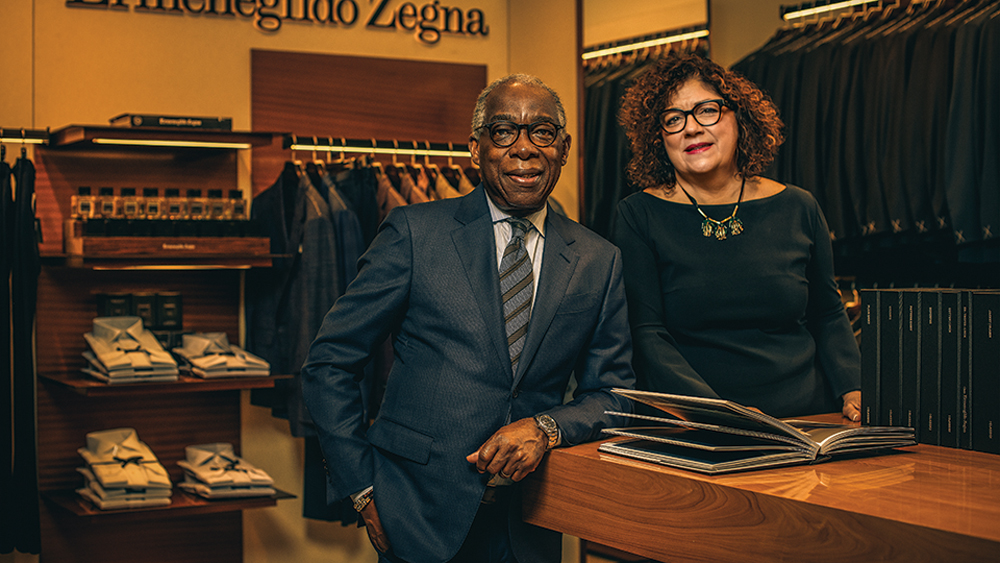Over 52 years, Jim Hines has helped style thousands of men in high-end clothing at Rodes and has become one of the top sellers in the country of Italian designer Ermenegildo Zegna — so much so that he’s traveling to Italy this summer to attend an invite-only Zegna “conclave.” With all that in mind, it should come as no surprise that Hines is head-to-toe dapper, so sharp he could gut an Old Navy just walking by. His look on the March day I meet him: navy-blue half-lined Zegna suit, striped tie made of whatever fabric looks polished to a sheen, taupe monk-strap leather shoes, Armani circular-lensed glasses.
I sit down with Hines at Rodes a few weeks before the Derby season slams the 105-year-old Louisville fashion stable. Why does he like the work? “It keeps me young,” says Hines, who declines to give his age. “I like working with people.” Get him talking about fashion, his tone is one of pure respect. His favorite Derby fashion era? “Right now. The colors are clearer. The patterns are beautiful. The coats are shorter. Everything fits closer to the body,” he says. He points to a mannequin wearing a spring Zegna suit. “You put that on, you feel well-dressed,” he says.
There’s precision to everything Hines does — the way he talks and dresses, the way he presses and hangs outfits for clients. He even keeps handwritten lists of customers to contact for trunk shows or other events, each name highlighted in blue, purple, orange or yellow to differentiate who has RSVP’d from who may need a call back. Hines, originally from near Bowling Green, credits this characteristic, at least partially, to the three years he spent as a clerk and typist in the U.S. Army after high school. He’s fully aware of his detail-oriented, straight-laced vibe, so a few minutes into the interview he waves over Cheri, his wife of 31 years. “Cheri will bring the excitement to this,” he says, dryly. The two met in 1983 when she was shadowing him as a new Rodes employee. They’ve been together ever since — at work, at home. “He was the pro,” she says, remembering that day in 1983. “Still is.”
With playful brown curls and a wide smile, Cheri nearly floats when she moves, all cheer and openness. In other words: she’s bubbly. “He’s…not,” Cheri says with a laugh. But, she adds, he’s routinely Rodes’ top seller. At one point, Hines scrolls through his phone to show me his customer base, and with four or five aggressive swipes of his thumb we barely get to the letter “D.” The couple often work with the same customers, choreographing an effective, subtle dance — Hines with the suit, Cheri with the shirts and accessories. “There’s an art in sharing the stage,” Cheri says. “If I step in, he steps out. Not a lot of people can do that.”
Hines started at Rodes in 1966, working in receiving. That only lasted a few months because owner Jack Rodes picked up on Hines’ interest in style and hired him as Rodes’ first African-American sales associate, in the original location downtown on Walnut Street (now Muhammad Ali Boulevard). (The store has moved a couple times and is now located on Brownsboro Road.) In an era when racial tensions were high, Hines says he didn’t experience too much trouble with customers. “It’s just that idea of having a smile on your face and start talking to them,” he says.
Hines has worked with one customer for 45 years and has helped dress three generations in a few different families. “There’s not a whole lot else I would do if I retired,” he says. “My health is good. I feel good.”
Cheri says that when her husband does decide to leave Rodes, it will likely unfold as a gentle fade-out. “The smart thing to do would be to (retire) gradually,” she says. “Because of his customer base, in our industry, your presence is worth a lot, just your presence on the floor. Even if he wasn’t selling to each customer, him being here is part of the deal.”
This originally appeared in the April 2019 issue of Louisville Magazine as the Portrait. To subscribe to Louisville Magazine, click here. To find us on newsstands, click here.
Photo by William DeShazer, williamdeshazer.com


